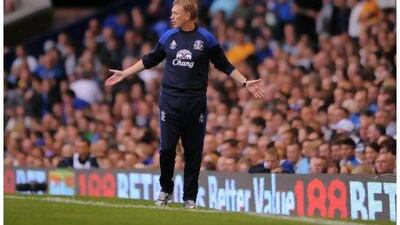These are troubled times for certain long-serving managers. The criticism levelled at Arsene Wenger is that he does not spend. The concern for Everton's David Moyes is that he can't.
On Saturday, Goodison Park was witness to a beaming manager discussing his intent to make several quality signings.
Predictably, it was not Moyes. Neil Warnock, the Queens Park Rangers manager, went away with the points to contemplate a busy conclusion to the transfer market. A grim-faced Moyes, accepting the bank would take most of the proceeds of any sales, is likely to be a silent spectator while others spend.
Retail therapy is not the remedy for every ailment, as Moyes has proved in his long reign, but Everton's principal on-field failings have been apparent for at least a year. Stability has been a strength under the Scot, but complete continuity deprives him of the chance to address the weaknesses. Were the bank's bonuses suddenly redirected into his transfer kitty, it is evident where the two priorities would lie: on the flanks and in attack.
Everton do actually have a high-class centre-forward, but only on the occasions when Louis Saha's notoriously fragile frame is not giving way. Without him, or when the Frenchman is only deemed partially fit, Moyes has to embark upon ingenious attempts to compensate.
There was a time when Everton operating without a specialist striker was newsworthy. Now it has happened so frequently, it tends not to attract attention. Except that, when Jermaine Beckford was withdrawn in Saturday's defeat, boos greeted the arrival of the midfielder Marouane Fellaini.
Yet Beckford is an erratic option, part Premier League, part non-league, signed, in all probability, because he was available on a free transfer. A shot to nothing can produce little when he is not shooting.
Then there is Victor Anichebe, the youth team graduate who has the imposing physique but not the footballing qualities or, more often than not, the finish. Beyond that, there is only Yakubu, never the same player since a serious Achilles injury and is available for transfer.
On the wings, too, Moyes has to be creative, though some of the incumbents of the wide positions are not. Everton's most effective winger last season was Seamus Coleman, a converted full-back.
Diniyar Bilyaletdinov is a £10 million (Dh60.5m) recruit - probably the last for quite some time - whose left foot is wonderful. The rest of the slight Russian, however, seems rather less attuned to the Premier League.
On Saturday, the answer was to play two central midfielders on the flanks. The 17-year-old Ross Barkley sparkled; the 20-year-old Jack Rodwell did not.
It rather symbolised the way the latter has lost his way; Barkley is upstaging him as Goodison's next great hope, while were Rodwell realising his considerable potential, Everton's financial problems might have been alleviated by his departure.
His case might be served by a role in the middle, but his form does not merit it.
Tellingly, Rodwell was not among the four "untouchables" named by Bill Kenwright, the chairman, last week, the players he would not countenance selling (Moyes, citing Cesc Fabregas, stated that everyone has a price).
But it says something about the character of the players that Phil Jagielka, the Arsenal target, does not agitate for a move; nor does Leighton Baines, another with admirers. Moyes's loyalty is mirrored by his current charges.
It is that steadfastness that prevents Everton from declining further. Their premier players are not devising exit strategies. Nor is their manager. But Moyes is in a different job to his counterparts at other clubs. They are not operating without scope for manoeuvre, deprived of the impetus and alternatives arrivals can give them. They do not have to motivate the same group, camouflage the same flaws and maintain the same standards without outside assistance.
And this is where the difference between the two managerial stalwarts is at its starkest. There are those who believe, harshly, that Wenger is part of the problem at Arsenal. At Everton, Moyes has to be the solution. There is no other way.
>>>
When a manager makes six changes and alters the shape of his side, it tends to be the reaction to a crushing defeat, not a creditable point.
Paul Lambert's rethink between Norwich's 1-1 draw at Wigan Athletic and the same result against Stoke City suggested the Premier League has a manager who will pick certain players and systems with different games in mind. Left-field thinking, bold tactics and confusing the opposition are among the ways clubs can compensate if they have, as Norwich arguably do, inferior players.
Lambert's tinkering is a new slant on the age-old question of how a promoted club can stay in the top flight.
>>>
Two fine displays that have produced no points. Two games that were heading for draws until comparatively late winners. Two goals conceded as a result of cruel similarities.
There has been an uncanny similarity to West Bromwich Albion's opening fixtures of the season, down to the recent recruit Shane Long scoring in both.
But as they linger in the early-season relegation zone, the consolation should be that acquitting themselves well against Manchester United and Chelsea bodes well for the lesser tasks to come.


